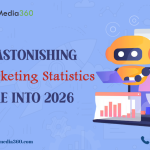Data Privacy in Digital Marketing

Between protecting customer data and personalizing the audience experience, we can’t argue that modern digital marketing is more complex than it used to be. And that’s mainly because the two concepts are both sides of the same coin in digital marketing.
Comparatively, there are tasks that provide a customized consumer experience. This is a process that relies on comprehensive consumer data. On the other hand, you need to limit the collection of customer data so that the information provided by the customer is not misprocessed or used.
As a digital marketer, your job no longer consists of creating sharp and creative campaigns. It also ensures that you must implement specific measures to protect the collection of your customers’ data.
Customer’s data which consists of –
- Contact Information
Name, Address, Phone Number, Email Address. - Financial Information
Credit Card Numbers, Bank Account Numbers. - Usage Details
Tracking on Websites, Cookies, etc.
1st Party Data and 3rd Party Data
Data is the king and while talking about data privacy and protection there comes first and third party data. These data are the magic ingredients which helps companies providing with crisp and accurate advertisements which automatically affect a marketing campaign to become successful.
First-party data – Any customer data which is collects from your own website is the first party data. For example, someone visits your website and enters their email address to subscribe to your company’s emails. Their email address is a piece of information that your company has collected. It is first-party information. First-party data privacy concerns are minimal because you know exactly where it came from and, as a marketer; no doubly you own the data.
Third-party data – It is the data which collects by companies without having any direct relations with the customers. In simple term, you acquire some first-party data from a company which is your third-party data. The data privacy is questionable here because you will never know how the data was collected or if it is maintaining the data privacy regulations.
Data Privacy Becomes Even More Important
The internet as we know it today is clearly more powerful than ever. The internet now allows for information exchanges to take place in a matter of seconds. But with this rapid exchange of countless information is that safety is not guaranteed. The more we were evolving in this digital world, the better we are understating and giving importance to the privacy of our data.
Having prior too many data breach incidents, customers are now becoming cautious with the information they intend to share online. Cautious to a point they’re willing to withhold information that internet apps and companies collect to personalize their browsing experience.
Here come the data protection laws. Most of the countries imply data protection laws to ensure a safe and secure browsing experience for every individual. The two major data protection laws are as follows –
GDPR – General Data Protection Regulation is a law that ensures the digital privacy and security of EU (European Union) citizens. Companies need to have their customer’s consent in order to collect their data. And the customers have the right to opt out from collecting their personal data. GDPR applies to any companies which operate within the EU and also those companies which provide services in the EU.
CCPA – California Consumer Privacy Act is a data privacy law that controls how businesses all over the world are permitted to handle California residents’ personal information. The residents can opt-out from their data being sold to any third parties, and have the right to deletion of the data which is previously collected.
Three Practices To Protect Customer Data
- Cooperation with governing laws – The laws we have mentioned above exist for a reason. Those laws consist of many data privacy principles which we must follow in order to build a safe place for users. While collecting data from customers, companies or websites must obey the rules and have the consent of their customers.
- Being transparent – Transparency with our customers win trust. What is that even mean? Customers want transparency and full knowledge about what we are willing to do with their information. You as a marketer should always show your intention or whatever reason you’re gathering information from your customers, and make sure your communication is clear.
- Customer data privacy protection – You must try to protect your customer’s data within or outside of your company. In your own organization built an environment that allows people to respect the privacy of your customers. Also, you can partner with some companies that offer data protection. Such companies are Clearswift, PWC, Ernst & Young, etc.
Co-existence of Digital Marketing With Data Privacy
All of these new regulations restrict digital marketers’ ability to use data to create a personalized experience for shoppers and customers.
For example, with new Apple devices, the user can choose to not track their data by third-party applications such as Facebook and Instagram. This may set a limit to marketing but also can be an evolution of marketing in the digital world. Companies need to adapt and follow the data privacy regulations to protect their customer’s data. Also, they need to more rely on first-party data for more accurate information and build a secure user experience.






